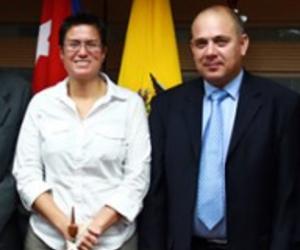Cuban doctors to arrive in Ecuador in December
- Submitted by: lena campos
- Health and Medicine
- 11 / 20 / 2013

The first of 1,000 Cuban mostly primary-care physicians will begin arriving in Ecuador in December, under agreements signed by the health ministries of Cuba and Ecuador last week in Havana.
The first 200 family doctors should arrive in late January, according to one of the agreements signed by Ecuadorean Health Minister Carina Vance and her Cuban peer, Roberto Morales Ojeda. The agreements also cover epidemiologists and physical therapists.
The Cuban help allows implementation of a more cost-efficient primary-care model in the country that focuses on prevention, the Ecuadorean health ministry argues in a press release.
“This leads directly to a reduction in the use of services that require hospitalization or curative treatment due to gravity and complications, as well as health rehabilitation services,” a communique by the Ecuadorean health ministry says.
President Rafael Correa announced in September that his government would spend $30 million per year on the program.
“This is a model we have to implement in Ecuador,” Correa said at the time about Cuba’s primary care physicians, the backbone of the island’s cost-efficient medical system. He added that the Cuban doctors will be a stopgap measure while more Ecuadorean primary-care physicians are being trained in Cuba.
Cuba’s Latin American School of Medicine (ELAM) has graduated 1,400 Ecuadorean students, for which Ecuador has paid $218 million, according to that country’s health ministry. Cuba has committed to training 10,000 Ecuadorean primary-care community physicians and technicians.
The Cuban doctors will work in underserved poor neighborhoods and rural areas, practicing primary-care, family and preventive medicine.
The backbone of Cuba’s for-pay medical service exports has been Venezuela, covering some 30,000 Cuban healthcare practitioners. The Ecuadorean agreements further broaden Cuban efforts to diversify for-pay exports. Marking a major breakthrough, Brazil is contracting 5,400 Cuban doctors, generating estimated revenues of $250 million per year for Cuba. Cuba is also expanding more modest medical service programs in South Africa, Angola and Algeria, and it started programs in Saudi Arabia, Qatar, and Portugal. Finally, Norway and Brazil have funded medical relief efforts involving Cuban doctors in Haiti.
While service exports — most of them medical services — a decade ago surpassed tourism as Cuba’s main source of hard currency, by far most of the healthcare exports are under agreements with oil-rich Venezuela. An estimated 30,000 medical personnel from Cuba work in Venezuela, or in third countries under programs funded by Venezuela.
Next to healthcare service exports, the biggest gain for the Cuban economy of closer medical cooperation with Ecuador could be pharmaceutical exports.
In 2011, Correa pledged his country would buy up to $1.5 billion worth of Cuban-made medical drugs and vaccines that year. The pledge came after the Ecuadorean health minister toured Laboratorios Novatec and Laboratorios Farmacéuticos AICA in Havana, which produce generic versions of Aspirin and Tamiflu, as well as medical supplies such as vials and aerosols. However, arguing that Cuban products were not registered in their country, Ecuadorean critics were apparently able to significantly reduce these purchases; at the time, Correa publicly complained about “sabotage” in his own health ministry.
Source: CubaStandard.com
Comments